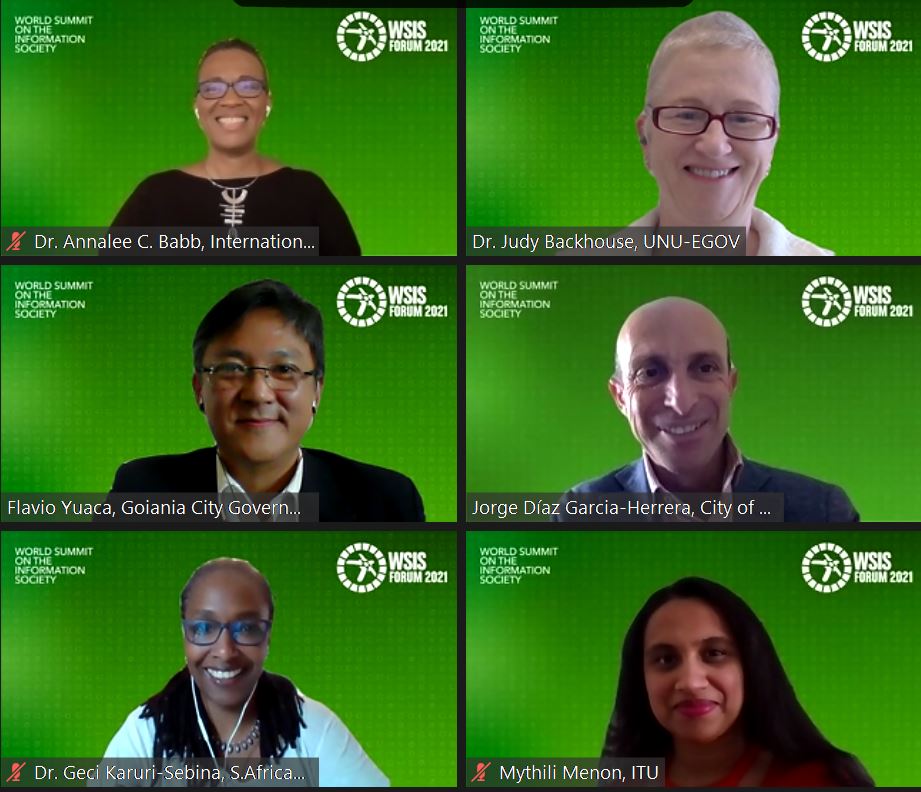Simple Ways to be Smart
United for Smart Sustainable Cities and the United Nations Operating Unit on Policy Driven Electronic Governance
Session 249
Expanding understandings of smart
Smart Cities are generally understood in terms of the application of new technologies to improve life in cities. For many cities that are grappling with the provision of basic services, embracing smart technologies appears as a luxury that they can ill afford. Smart agendas are often considered relevant only for large, wealthy and well-functioning cities as these are the cities that are often described as smart. However, cities that are smaller, or shrinking, cities that are dysfunctional, and cities that have fewer resources could stand to gain the most from the use of smart technologies to address their challenges.
As a part of its core outputs, United for Smart Sustainable Cities (U4SSC) examined how such cities could use smart technologies to improve their effectiveness and sustainability, while simultaneously pursuing local agendas. This research, which was led by the United Nations Operating Unit on Policy-Driven Electronic Governance (UNU-EGOV), culminated in the report “Simple Ways to be Smart”. U4SSC is a United Nations initiative that serves as a platform for deliberations on smart and sustainable transitions in the urban context. It was established in 2016 and is supported by 17 UN entities and programmes.
The proposed workshop will be jointly hosted by the International Telecommunication Union (ITU) and UNU-EGOV with a panel that will include key experts who contributed to the drafting of the report as well as local government officials who will speak to the challenges they face and elaborate on how smart technologies have been used in their cities. Panellists will represent contexts that are not traditionally associated with high-tech smart cities. Workshop participants will be provided with the opportunity to share how they see smart cities being relevant for their contexts and examples of their experience.

Mythili Menon works as Project Officer at the International Telecommunication Union (ITU) in the domain of standardization for new and emerging technologies. She serves as the Advisor of the ITU/WMO/UNEP Focus Group on Artificial Intelligence for Natural Disaster Management (FG-AI4NDM). Mythili possesses a strong background in environmental science, standardization and the policy frameworks underlying sustainable development issues. Between 2015-2017, she worked for the ITU-T Study Group 20 on 'Internet of Things and Smart Cities and Communities' and ITU-T Study Group 5 on ‘Environment, Climate Change and Circular Economy’. Previously, she worked as the Standardization Lead at Mandat International for various EU Horizon 2020 projects. Mythili holds a Masters in 'Standardization, Social Regulation and Sustainable Development' from the University of Geneva. She completed her Bachelors in 'Environmental Science and Chemistry' from University College Utrecht in the Netherlands. The areas relating to the sustainable development goals, artificial intelligence, blockchain, intelligent transport systems, disaster management, data management, smart cities, and IoT are of enduring interest to her and she has co-authored several publications on these subjects.
Master on Telecommunications Engineering and Senior Official of Systems and Communications Technologies of the Spanish Government, Jorge Díaz Garcia-Herrera joined the City of Ronda in 2003 as Information Technologies Project Manager. Since then, he has led several projects involving telecommunications and information technologies in order to increase the efficiency of the city internal processes and to ease the relationship between citizens and local authorities. As an information technologies professional with experience in local administration, he has also audited digital cities projects in other municipalities and taken part in national and international normalization bodies in the Smart Cities Area.
Flavio Yuaca is a superintendent at Goiania City Government, Brazil and a former Government Fellow at UNU-EGOV (2020). He is a geoprocessing expert (Universidade Federal do Parana, Brazil, 1996) and has been working with Information and Communications Technology (ICT) for more than 30 years. At Goiania City Government he was the executive coordinator for projects derived from the Inter-American Development Bank’s Emerging and Sustainable Cities Initiative, including the Greenhouse Gas Inventory, Results-Based Management and the Integrated Operations and Control Center (IOCC), part of the strategy to introduce Smart Cities concepts in Goiania. He also served on editorial boards of Brazilian magazines and technical committees of Brazilian conferences related to geographic information and technology. He was an instructor at the Geospatial Information and Technology Association (GITA) and in postgraduate courses in the area of geotechnologies.
Dr. Geci Karuri-Sebina is currently the National Organiser for the African Civic Tech Innovation Network hosted at the University of Witwatersrand’s School of Governance; Adjunct Professor at the University of Cape Town’s African Centre for Cities; and an Associate of South African Cities Network. She is also on Singularity University’s global faculty in the areas of Future of Cities and Governance. Geci has a diverse background, spanning a range of foresight, policy, innovation and practice topics, and has worked extensively in R&D, government and civic organisations.
Dr. Annalee C. Babb is an international consultant with more than 17 years specialising in digital transformation, innovation, digital media, investment and export promotion. She is the Prime Minister’s Special Envoy and Special Advisor to the Minister of Innovation, Science and Smart Technology, Barbados. She leads the team developing COVID-19 public health emergency management tech solutions for Barbados. She is legislative co-Chair for the development of a national digital identity and mobile ID, lead on the creation of a Barbados Tech Accelerator for the delivery of digital public services, and Chair of Government’s Telecoms Working Group. She chairs the Digital Transformation and Solutions Committee of the Prime Minister’s Jobs and Investment Council, formed to develop a national response to mitigate the impact of the COVID-19 global pandemic. (www.drannaleecbabb.com)
Judy Backhouse has experience as both an academic scholar and an information and communications technologies (ICT) practitioner. She is currently a Senior Academic Fellow at UNU-EGOV, after eight years as an Associate Professor at the University of the Witwatersrand in Johannesburg. Her recent research is into the governance of smart cities. She has researched ICT for development and e-Government. Dr Backhouse worked in the private sector in technical ICT and management roles. She spent two years at the South African Council on Higher Education where she was responsible for monitoring the Higher Education Sector in South Africa and advising the Minister of Higher Education. She has also been an entrepreneur, having launched (and closed) a co-working business in Johannesburg.
-
 C7. ICT applications: benefits in all aspects of life — E-government
C7. ICT applications: benefits in all aspects of life — E-government
This workshop and the Simple Ways to be Smart report are designed to broaden the conversation about Smart and Sustainable cities to be more inclusive. Smart technologies can and should be used by cities to enhance their functioning and the experience of their residents, in many small ways. Some of these, like good municipal services, are not “sexy” in the same way that many of the emerging technologies usually associated with Smart Cities are, but they are smart in that they enable cities to deliver better services with fewer resources. The report highlights the many ways in which ICT applications can be used by city governments to benefit city stakeholders.
-
 Goal 11: Make cities inclusive, safe, resilient and sustainable
Goal 11: Make cities inclusive, safe, resilient and sustainable
ICTs have the potential to address many of the challenges in making cities inclusive, safe, resilient and sustainable because they can improve service delivery with limited resources, increase consultation and engagement, monitor conditions in cities and use data to improve decision-making. However, much of the smart city energy focuses on new technologies that do not necessarily tackle these more mundane problems of city management. Indeed, research has shown that some smart city agendas exacerbate inequality and environmental concerns. This workshop seeks to open up the smart city discourse to the use of well-known ICTs to address basic city problems in an attempt to better align smart cities with the goals of inclusivity, resilience and sustainability.
U4SSC: http://staging.itu.int/en/ITU-T/ssc/united/Pages/U4SSC-IP.aspx
UNU-EGOV: https://egov.unu.edu/
Report: https://www.itu.int/en/publications/Documents/tsb/2021-U4SSC-Simple-ways-to-be-smart/index.html
